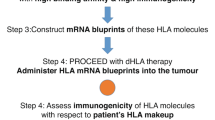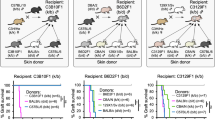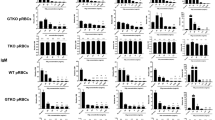Abstract
THE mixed leucocyte interaction (MLI) occurs in an in vitro culture system in which immunological recognition between blood lymphocytes from genetically different donors can be detected and measured by blastoid transformation of these cells, increased mitotic rate or increased DNA synthesis. The phenomenon is usually considered to involve differences in transplantation antigens between the reacting cell populations. Although an immunological basis for the MLI has been shown with lymphocytes of human1–4, rat5–7 and dog8 origin, it would be advantageous to adapt this test to a model system such as the inbred mouse in which the genetic and antigenic basis of tissue graft rejection has been carefully investigated during the past 60 years. Such adaptation is reported here.
This is a preview of subscription content, access via your institution
Access options
Subscribe to this journal
Receive 51 print issues and online access
$199.00 per year
only $3.90 per issue
Buy this article
- Purchase on Springer Link
- Instant access to full article PDF
Prices may be subject to local taxes which are calculated during checkout
Similar content being viewed by others
References
Bain, B., Vas, M. R., and Lowenstein, L., Blood, 23, 108 (1964).
Rubin, A. L., Stenzel, K. H., Hirschhorn, K., and Bach, F., Science, 143, 815 (1964).
Bach, F., and Voynow, N. K., Science, 153, 545 (1966).
Bach, F., and Kisken, W. A., Transplantation, 5, Part 2, 1046 (1967).
Gordon, J., David-Faridy, M. F., and MacLean, L. D., Transplantation, 5, Part 2, 1030 (1967).
Wilson, D. B., J. Exp. Med., 126, 625 (1967).
Wilson, D. B., Silvers, W. K., and Nowell, P. C., J. Exp. Med., 126, 655 (1967).
Main, R. K., Cole, L. J., Jones, M. J., and Haire, H. M., J. Immunol. 98, 417 (1967).
Hulliger, L., and Blazkovec, A. A., Lancet, i, 1304 (1967).
Eagle, H., Science, 130, 432 (1959).
McLimans, W. F., Davis, E. V., Glover, F. L., and Rake, G. W., J. Immunol., 79, 428 (1957).
Moskowitz, M., and Kelker, N. E., Science, 41, 647 (1963).
Wintrobe, M. M., Clinical Hematology, fifth ed., 331 (Lea and Febiger, Philadelphia, 1961).
Morse, S. I., J. Pediat., 65, 1019 (1964).
Morse, S. I., J. Exp. Med., 121, 49 (1965).
Morse, S. I., and Riester, S. K., J. Exp. Med., 125, 401 (1967).
Author information
Authors and Affiliations
Rights and permissions
About this article
Cite this article
MAIN, R., JONES, M. Mixed Leucocyte Interaction involving Mouse Strains of Strong and Weak Allogeneic Specificities. Nature 218, 1251–1252 (1968). https://doi.org/10.1038/2181251a0
Received:
Revised:
Issue Date:
DOI: https://doi.org/10.1038/2181251a0
This article is cited by
-
Induction of the immune response to cell surface antigens in vitro
In Vitro (1975)
-
Immunological Potential of the in vitro Mixed Skin Cell-Leukocyte Reaction
Nature New Biology (1971)
-
Activation of Host Lymphocytes cultured with Cancer Cells treated with Neuraminidase
Nature New Biology (1971)
Comments
By submitting a comment you agree to abide by our Terms and Community Guidelines. If you find something abusive or that does not comply with our terms or guidelines please flag it as inappropriate.



